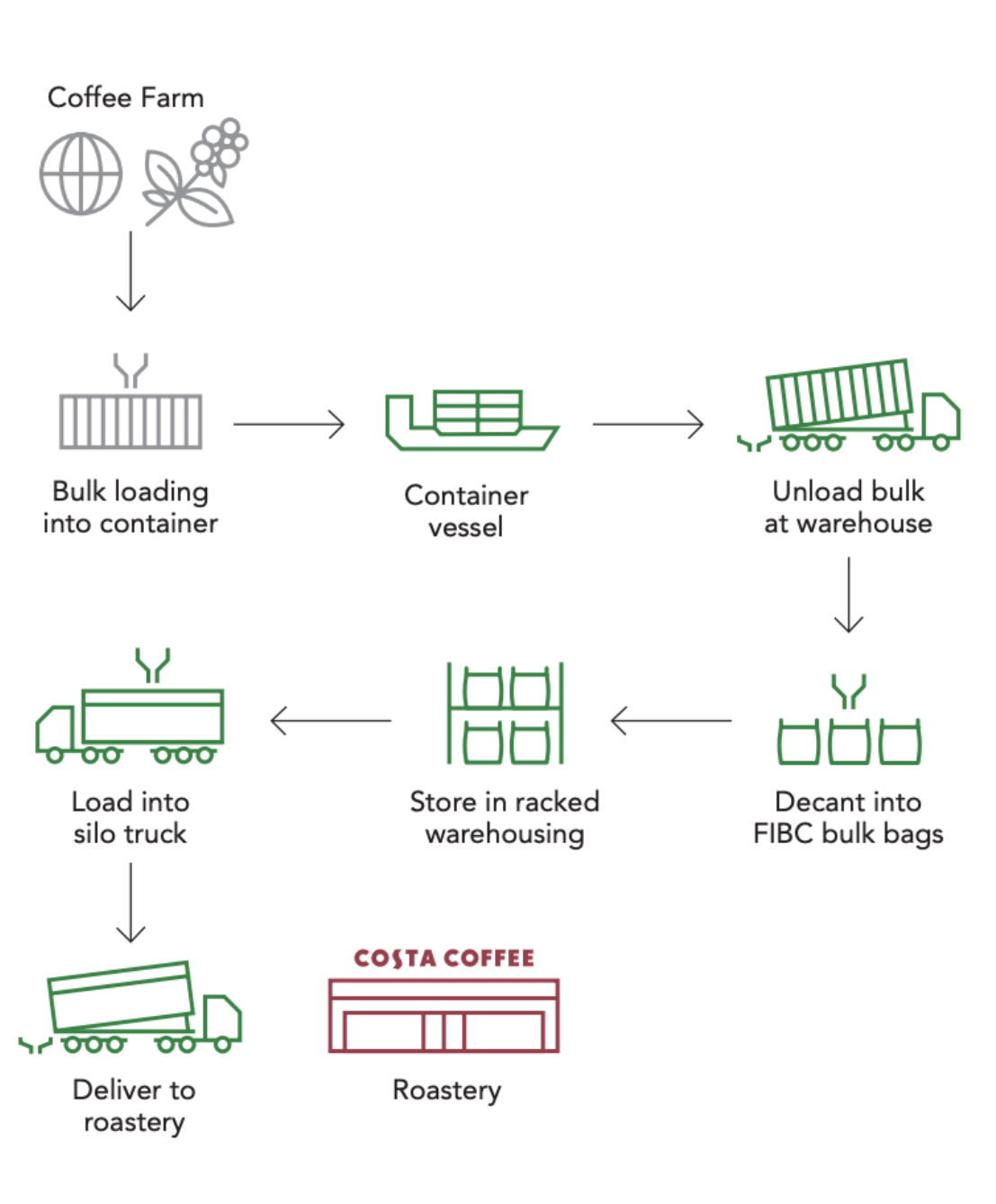

Costa Coffee previously sourced from six different coffee suppliers on a DDP basis but wanted to improve both product quality and supply chain efficiency. Partnering with Commodity Centre, they achieved a more reliable, sustainable and cost-effective coffee warehousing and logistics solution.
Our Customer
Founded in London by Italian brothers Sergio and Bruno Costa in 1971, Costa Coffee is now a global name in coffee. The brand operates in 41 countries, with over 2,700 coffee shops across the UK & Ireland and 1,100 internationally.
In 2011, Costa Coffee acquired Coffee Nation, which became Costa Express. Today, Costa Express operates in 16 international markets, running more than 11,000 self-serve coffee bars in the UK and over 1,100 globally, delivering barista-quality coffee on the go.
The Opportunity
Costa Coffee wanted to create efficiencies across their entire coffee supply chain network, from import to delivery.
Historically, coffee beans were imported in 65-kilo jute bags, manually unloaded from containers, stacked on pallets, stored in the warehouse and then delivered to the roastery. Once at the roastery, bags were unloaded by hand and emptied into hoppers.
This traditional process was labour-intensive, time-consuming and inefficient, prompting Costa to look for a more automated, sustainable and cost-effective logistics solution.

Our Solution
Commodity Centre designed and delivered a bespoke warehousing solution built around Costa Coffee’s operational goals:
- To create a purpose-built facility that complemented Costa’s state-of-the-art roastery.
- To reduce manual handling and streamline logistics for improved efficiency.
A 60,000 sq ft dedicated coffee warehousing facility was designed and fitted out, optimised for the handling and storage of bulk coffee. Using narrow aisle racking systems and advanced forklift trucks, the site offered significantly increased capacity and improved workflow compared with previous facilities.
The warehouse also featured a custom-built loading and unloading zone with specialised machinery for bulk coffee handling.
To further enhance efficiency, Commodity Centre introduced a bulk shipping model, replacing smaller jute bags. This increased container capacity from 19.2 to 21.6 metric tonnes , a 12.5% improvement , reducing shipping costs, carbon emissions and energy use.
At the warehouse, containers are decanted into reusable bulk bags and stored in racked systems. When required, coffee is transferred using automated machinery into silo trucks for delivery to the roastery.
The Results
This new system achieved substantial operational and environmental benefits:
- 12.5% reduction in shipping costs
- Bespoke, dedicated warehousing terminal
- Zero manual handling at customer premises
- Significant efficiency gains across the coffee supply chain
- 15% increase in raw coffee beans loaded for delivery to the roastery
- Electric-powered forklifts for sustainable handling
- Lower costs, reduced carbon and energy consumption
- Entire terminal powered by solar energy
Following Costa’s initial project in 2016, a new long-term partnership was established, reinforcing a shared commitment to innovation, efficiency and sustainability across the coffee supply chain.
Impact
Today, Costa Coffee benefits from a streamlined, sustainable and high-performance coffee supply chain. The partnership with Commodity Centre ensures reliable storage, handling and delivery, all while reducing costs and environmental impact.
This collaboration reflects Commodity Centre’s expertise in designing supply chain and warehousing solutions for major food and beverage brands.








